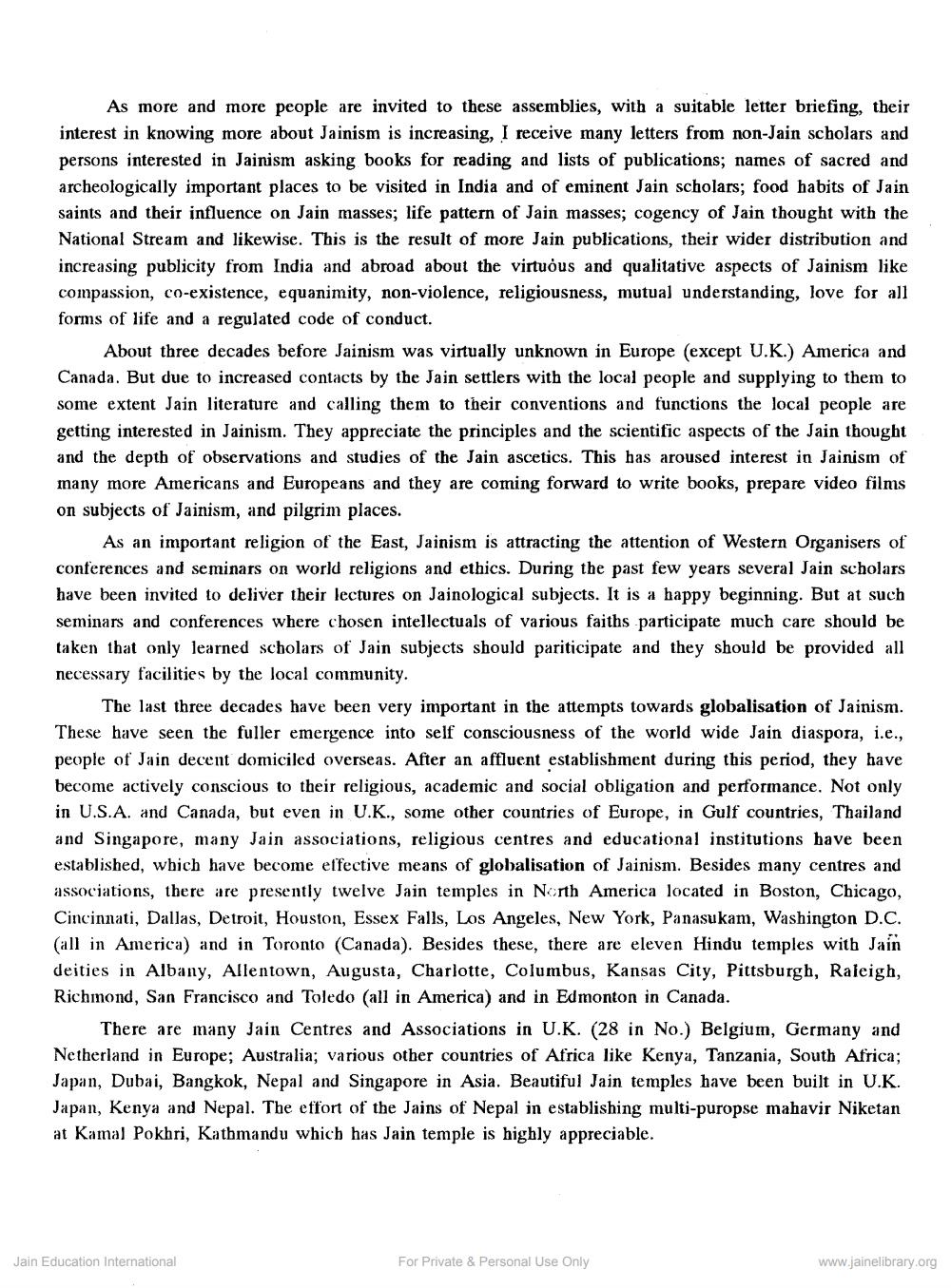________________
As more and more people are invited to these assemblies, with a suitable letter briefing, their interest in knowing more about Jainism is increasing, I receive many letters from non-Jain scholars and persons interested in Jainism asking books for reading and lists of publications; names of sacred and archeologically important places to be visited in India and of eminent Jain scholars; food habits of Jain saints and their influence on Jain masses; life pattern of Jain masses; cogency of Jain thought with the National Stream and likewise. This is the result of more Jain publications, their wider distribution and increasing publicity from India and abroad about the virtuous and qualitative aspects of Jainism like compassion, co-existence, equanimity, non-violence, religiousness, mutual understanding, love for all forms of life and a regulated code of conduct.
About three decades before Jainism was virtually unknown in Europe (except U.K.) America and Canada. But due to increased contacts by the Jain settlers with the local people and supplying to them to some extent Jain literature and calling them to their conventions and functions the local people are getting interested in Jainism. They appreciate the principles and the scientific aspects of the Jain thought and the depth of observations and studies of the Jain ascetics. This has aroused interest in Jainism of many more Americans and Europeans and they are coming forward to write books, prepare video films on subjects of Jainism, and pilgrim places.
As an important religion of the East, Jainism is attracting the attention of Western Organisers of conferences and seminars on world religions and ethics. During the past few years several Jain scholars have been invited to deliver their lectures on Jainological subjects. It is a happy beginning. But at such seminars and conferences where chosen intellectuals of various faiths participate much care should be taken that only learned scholars of Jain subjects should pariticipate and they should be provided all necessary facilities by the local community.
The last three decades have been very important in the attempts towards globalisation of Jainism. These have seen the fuller emergence into self consciousness of the world wide Jain diaspora, i.e., people of Jain decent domiciled overseas. After an affluent establishment during this period, they have become actively conscious to their religious, academic and social obligation and performance. Not only in U.S.A. and Canada, but even in U.K., some other countries of Europe, in Gulf countries, Thailand and Singapore, many Jain associations, religious centres and educational institutions have been established, which have become effective means of globalisation of Jainism. Besides many centres and associations, there are presently twelve Jain temples in North America located in Boston, Chicago, Cincinnati, Dallas, Detroit, Houston, Essex Falls, Los Angeles, New York, Panasukam, Washington D.C. (all in America) and in Toronto (Canada). Besides these, there are eleven Hindu temples with Jain deities in Albany, Allentown, Augusta, Charlotte, Columbus, Kansas City, Pittsburgh, Raleigh, Richmond, San Francisco and Toledo (all in America) and in Edmonton in Canada.
There are many Jain Centres and Associations in U.K. (28 in No.) Belgium, Germany and Netherland in Europe, Australia; various other countries of Africa like Kenya, Tanzania, South Africa; Japan, Dubai, Bangkok, Nepal and Singapore in Asia. Beautiful Jain temples have been built in U.K. Japan, Kenya and Nepal. The effort of the Jains of Nepal in establishing multi-puropse mahavir Niketan at Kamal Pokhri, Kathmandu which has Jain temple is highly appreciable.
Jain Education International
For Private & Personal Use Only
www.jainelibrary.org




